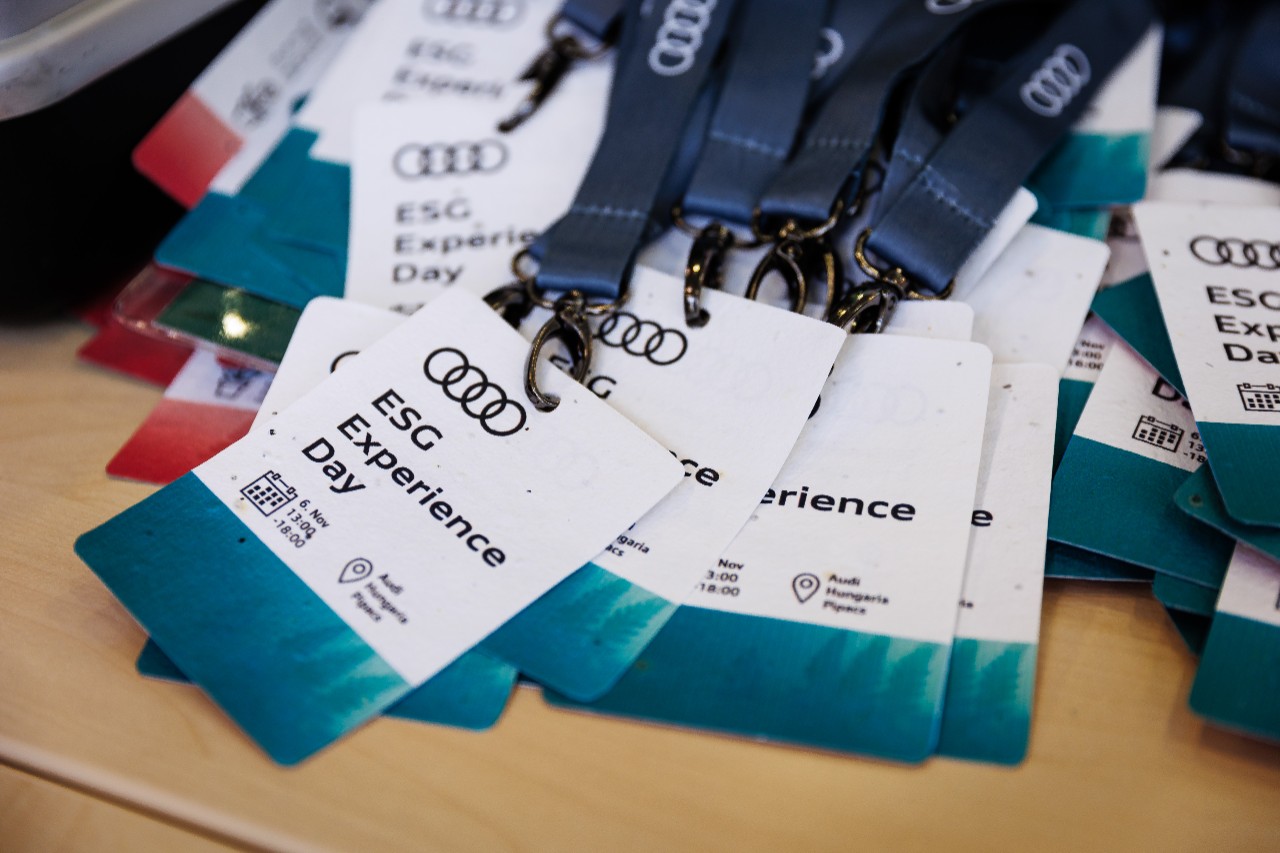For the first time, Audi Hungaria organized an ESG Experience Day, where our employees were able to gain an insight into environmental, social and corporate governance initiatives. “At this event, our objective is to provide our colleagues with a comprehensive understanding of the complexities associated with ESG, showcase our current ESG activities, and raise awareness about the challenges and opportunities inherent in this field,” states Gregor Wenk, the ESG Strategy & Management lead at Audi Hungaria.
“... We are Audi Hungaria. And we love the future.” The introductory film began with these sentences in the Pipacs event hall, providing a foretaste of the rich program of the Experience Day.
During the interesting panel discussions, the participants gained insight into measures that the company has been attaching great importance to for years or even decades. First and foremost, environmental protection, perhaps the most tangible topic within ESG. Dr. András Torma, Environmental Protection Specialist at Audi Hungaria and at the same time the head university lecturer of Széchenyi István University, reported on the efforts we are making towards decarbonization. He highlighted the significant challenges ahead in meeting the goal of operating all sites in a CO2-neutral manner by 2025.

“Audi Hungaria has already achieved this goal in 2020: since then, our plant has been covering a large part of its energy needs from certified green resources, and where it is not possible to use green energy, we support internationally recognized projects by purchasing CO2 credits so that we can also contribute to reducing global emissions on the other side of the world,” explains our colleague, who is personally and professionally committed to environmental protection issues.
We are pursuing a modern energy strategy and experimenting with new energy sources to make areas green that are currently difficult to decarbonize. We also learned from experts how measures we are familiar with from home, such as energy-saving LED lamps, can help to reduce the temperatures in our factory halls by up to 1 °C in the high summer heat.
The panel discussions also took us into other areas: experts from the fields of health management, HR development strategy and employment spoke with enthusiasm and commitment about their projects and gave us an idea of how many human aspects are covered by the topic of ESG, even though we were not even halfway through the event program. The so-called gender pay gap, defined as the discrepancy in remuneration between men and women for the same job in the same workplace, and the absence or existence of social benefits are just some of the objective factors that can be quantified. Henriett Czipf emphasized that there are still challenges with numerous indicators for measuring effectiveness within ESG, but that these are being solved step by step.

“I think this is how we can build an ESG-conscious community in our company,” she said, emphasizing that it's not just about taking care of our communities, but also our internal stakeholders and our employees. These thoughts were absolutely in line with the words of Michael Breme, who described the workforce and the health of our employees as the company's most important resources. This health includes not only physical but also mental well-being, which Audi Hungaria's excellent health management takes care of with initiatives such as “Soul Week”, the “Best Workplace Challenge”, vaccination campaigns and first aid workshops on the occasion of International Resuscitation Day.
The human aspect is present everywhere, even in an area as specialized as Purchasing, which is indispensable for production processes, materials and services. Our colleague Gergő Verasztó told us about a project developed in 2022 at AUDI AG to integrate social enterprises into their supply chains. This is how we got to know Dr. Veronika Hermann, who founded the Hatpöttyös restaurant in Székesfehérvár 12 years ago and has been running it ever since in order to create job opportunities for young people with mental disabilities or limited work capacity. Especially at the 30th anniversary celebration of Audi Hungaria, they proved almost literally before the eyes of the world that they are able to satisfy the catering needs of an international event at a high level, and they gave an impressive answer to the fact that even “ladybugs with six dots” (hence the name of the restaurant in Hungarian) can fly if we believe in them and give them the opportunity to fly.

“In addition to the Hatpöttyös restaurant, we came into contact with another 20-25 social enterprises, thus the handicraft products purchased as part of our social procurement activity are also available in the Audi Shop,” said Gergő Verasztó, who also added that this stock has already been reordered, as the action is very popular among our colleagues.

Our Controlling and Reporting departments provided interesting insights into ESG reporting obligations. We learned from Melinda Hanesz what aspects need to be taken into account when planning, which is why they are also considering other perspectives in the medium term in addition to cost awareness, which is so important in the current economic environment. “In this way, a foreign specialist with a lot of international experience can have the advantage of bringing in diversity, professionalism and different perspectives, albeit in some cases at a higher cost, but also with more benefits. It is a great challenge to integrate the ESG standards into our financial and economic activities.”

Brenda Klein gave us an insight into the day-to-day work of ESG reporting, where she and her team work closely with IT on increasingly automated digital solutions. Digitization should help manage the ESG data volumes as efficiently as possible. It should also make the data transparent, searchable, and retrievable at any time. “We are at the beginning of our journey, there is still a lot of work ahead of us to further expand our ESG data expertise and our ESG digitalization. But I think Audi Hungaria has a little less work ahead of it than many other Group companies that are just starting out.
I find the great commitment, stamina and agile flexibility of the entire ESG IT team at the company above average and it makes me incredibly proud of the entire team.”
Achim Grewe, our Board Member responsible for Finance, IT, Procurement and Compliance, summarized the results from the five panel discussions and highlighted the excellent conditions we have in Győr to seamlessly integrate ESG standards into our day-to-day business without incurring additional costs for our customers, by making decisions that are both profitable in the long term and environmentally and socially responsible.
During the event, participants were able to register for interactive programs with Audi Hungaria experts in so-called ESG spaces. In the ESG Space, in connection with the letter E, our employees were able to take an interactive tour through the four pillars of the “MISSION: Zero” environmental program - decarbonization, management of water and resources, and biodiversity - using numerous exhibits, including a tasting of delicious honey made at the Audi premises. In the neighboring room, our colleagues simulated how difficult it is to find, collect and then send the relevant ESG data of such a large company in an aggregated form. Those who wanted to play cards could also do so at the AHAM (Audi Hungaria Active at Work) awareness training, although the rules were not always fair, which taught our employees the importance of an open attitude and the acceptance of the community.
And how does our environment view us and the automotive industry? Gergely Litkai, a Karinthy Award winner and comedian who is also a proven sustainability expert, painted a humorous but comprehensive picture of this topic and climate change. While laughing out loud, we got answers to questions like whether watching Netflix has anything to do with the climate crisis or how people could wear the same pants all year round a century ago while we buy new clothes every season.

“The main reason for over-consuming is cultural. It is a huge challenge in the automotive industry to “do more”, but this is the only way we can embark on the path of change,” said our guest, summarizing his most important message.
The first ESG Experience Day ended with a film screening, where a series of documentaries provided an insight into the Audi Group's latest ESG activities. Speaking of insight: At the end of the day, everyone knew and felt what the letters ESG meant at Audi Hungaria and what was behind them.

